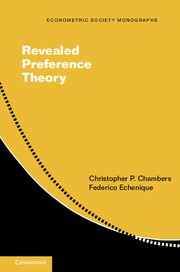Book contents
- Frontmatter
- Dedication
- Contents
- Preface
- 1 Mathematical Preliminaries
- 2 Classical Abstract Choice Theory
- 3 Rational Demand
- 4 Topics in Rational Demand
- 5 Practical Issues in Revealed Preference Analysis
- 6 Production
- 7 Stochastic Choice
- 8 Choice Under Uncertainty
- 9 General Equilibrium Theory
- 10 Game Theory
- 11 Social Choice and Political Science
- 12 Revealed Preference and Systems of Polynomial Inequalities
- 13 Revealed Preference and Model Theory
- References
- Index
- Miscellaneous Endmatter
9 - General Equilibrium Theory
Published online by Cambridge University Press: 05 January 2016
- Frontmatter
- Dedication
- Contents
- Preface
- 1 Mathematical Preliminaries
- 2 Classical Abstract Choice Theory
- 3 Rational Demand
- 4 Topics in Rational Demand
- 5 Practical Issues in Revealed Preference Analysis
- 6 Production
- 7 Stochastic Choice
- 8 Choice Under Uncertainty
- 9 General Equilibrium Theory
- 10 Game Theory
- 11 Social Choice and Political Science
- 12 Revealed Preference and Systems of Polynomial Inequalities
- 13 Revealed Preference and Model Theory
- References
- Index
- Miscellaneous Endmatter
Summary
The previous chapters deal with theories of individual agents’ behavior. In the rest of the book, we turn to economic theories that predict group or societal outcomes. We first turn our attention to general equilibrium theory.
General equilibrium theory can often be studied through a reduced-form model, the excess demand function of an economy. The equilibrium outcomes of the economy are given as zeroes of the excess demand function. There are two immediate questions about the scope of the model: What is the class of excess demand functions that can arise from a well-behaved economy? And which sets of prices can be equilibrium prices?
The answers to these questions carry a largely negative message about general equilibrium theory. The Sonnenschein–Mantel–Debreu Theorem (as we shall refer to it) shows that, roughly speaking, any continuous function that satisfies Walras’ law can be the aggregate excess demand function of a very well-behaved economy. The result implies that any compact set of strictly positive prices can be the set of Walrasian equilibrium prices of a well-behaved economy. No additional constraints are obtained by insisting on basic regularity properties of the equilibria.
Considered as data on an economy, an excess demand function, or a set of putative equilibrium prices, may seem odd. The next set of questions under study is much more similar to the approach in Chapter 3. If we assume that we can observe equilibria for different vectors of endowments (in a sense, we can sample from the “equilibrium manifold”), then the theory of general equilibrium can be refuted: There are nonrationalizable datasets. The theory is testable if we can observe prices from different endowment vectors. The nature of the testable implications follow from a very general principle, the Tarski–Seidenberg Theorem, which we shall also review here.
We focus on a model of an economy where all economic activity takes the form of exchange.
- Type
- Chapter
- Information
- Revealed Preference Theory , pp. 129 - 142Publisher: Cambridge University PressPrint publication year: 2016

